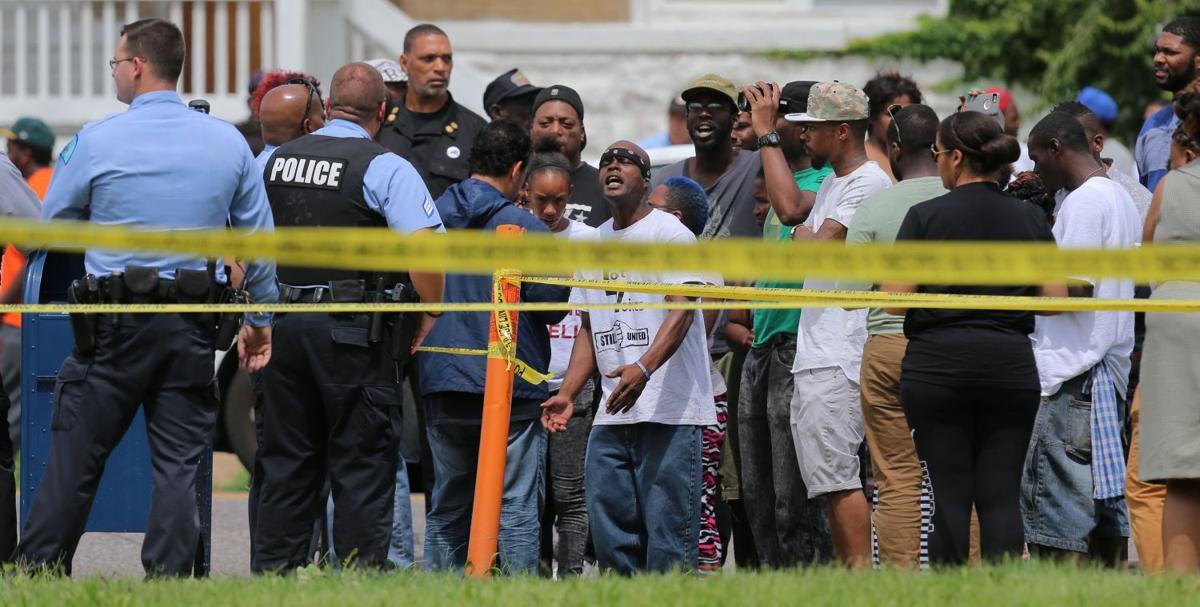ST. LOUIS ŌĆö A report that alleges a multitude of errors in 50 police shooting investigations in ║³└Ļ╩ėŲĄ was unsealed by a federal judge this past week, ending the cityŌĆÖs long fight to keep it under wraps.
ŌĆ£This is a smoking gun,ŌĆØ said attorney Javad Khazaeli, who represents the father of one of the shooting victims in a federal lawsuit. ŌĆ£This shows that the police department did not investigate police shootings properly.ŌĆØ
The city tried for years to keep the audit of the Force Investigative Unit from public view. First, the city did not reveal it to attorneys during a civil lawsuit discovery process. City lawyers then filed a sealed copy of the report when it was discovered. The city also denied a Post-Dispatch request for the report under the Sunshine Law, falsely calling it a ŌĆ£personnelŌĆØ record. And it has kept the report from the primary subject of the investigation, former police Lt. Roger Engelhardt, who ran the Force Investigative Unit from its inception in 2014 until 2018.
People are also reading…
The unit was started the same year Michael Brown was shot and killed in Ferguson. The goal was to bring more trust and transparency after police shootings in ║³└Ļ╩ėŲĄ.
Major Michael Sack (now a lieutenant colonel) ordered the audit on March 16, 2018, assigning the investigation to Lt. J.D. McCloskey, Sgt. Mickey Owens and Sgt. Tonya Porter. The 53-page report includes notes from the investigators and an outline of alleged deficiencies in four years of police shooting investigations. The Post-Dispatch previously obtained portions of the report from a law enforcement source.
Among the findings:
- After police officer Milton Green was shot by a fellow cop at a crime scene in 2017, Engelhardt appointed Steven Burle as an investigator on the case. BurleŌĆÖs son was the partner of the accused shooter.
- Police investigations were often ŌĆ£incompleteŌĆØ and essential information was ŌĆ£not properly documented.ŌĆØ
- Interviews with officers or witnesses were delayed for weeks, or even months, in several cases. Also, search warrants were delayed a week or longer in some cases.
- A report on a 2015 shooting was supplemented months later with 146 corrections.
- In another 2015 police shooting, the audit says, ŌĆ£No narrative is found in this report.ŌĆØ
- In a 2016 police shooting, the audit says, ŌĆ£Engelhardt only interviews police officer that discharged his firearm, no other officers interviewed.ŌĆØ
- In another 2016 shooting, a suspect and officers were not interviewed for more than a week after the incident.
- Engelhardt would commonly ŌĆ£not view a report assigned to his unit for months, or even years,ŌĆØ the audit says. It suggests Engelhardt was often working secondary employment and accuses him of not supervising his unit.
Khazaeli believes the city hid the report because it would have been devastating in lawsuits related to police shootings. To hold a city or its police department liable in a shooting, a plaintiff must show a ŌĆ£pattern and practiceŌĆØ of misconduct.
The report would provide proof of that pattern and practice, Khazaeli says. It finds fault, for example, with nearly every investigation of police shootings between 2014 and 2015.
Khazaeli and his colleagues first found out about the report in a lawsuit they filed on behalf of Green, a Black officer who was shot by a white colleague. After a police chase near where Green lived, he assisted officers at the scene even though he was off-duty at the time. One of the responding officers ended up shooting Green.
GreenŌĆÖs lawyers asked for all documents related to the shooting, and other police shootings, but attorneys from the city counselorŌĆÖs office did not produce the FIU audit.
ŌĆ£They never mentioned it,ŌĆØ Khazaeli says. ŌĆ£They never told us about it in multiple cases. They actively hid it until Roger Engelhardt was deposed and he mentioned it.ŌĆØ
Once the audit was filed under seal in GreenŌĆÖs case, the Post-Dispatch and the at Washington University sought to have the report opened, but the request was denied by federal Magistrate Joseph Dueker. He accepted the cityŌĆÖs explanation that the audit was a personnel record.
In a separate lawsuit, brought by the family of Mansur Ball-Bey, who was shot and killed by former ║³└Ļ╩ėŲĄ police Officer Kyle Chandler in 2015, federal Magistrate Shirley P. Mensah reached a different conclusion.
ŌĆ£The document does not, on its face, appear to be a personnel file or personnel record ŌĆ” Defendants have not pointed to any particular criminal investigation that would be compromised by the release of the FIU Audit,ŌĆØ Mensah wrote in her order for the city to unseal the report. ŌĆ£The document at issue bears on the question of whether the City properly investigated officer-involved shootings. The public interest ... is very high.ŌĆØ
The city counselorŌĆÖs office, which is representing Chandler, filed a notice of appeal of MensahŌĆÖs order but never actually filed an appeal. Instead, for the past seven months, it has filed a series of motions in federal court seeking extra time. During that time, Mensah issued sanctions against the city counselorŌĆÖs office, including fines for violating federal court rules about transparency. Finally, the city relented and filed the document Thursday night.
Engelhardt knew about the audit because the city used it to fire him in 2021, accusing him of ŌĆ£double dipping,ŌĆØ or being paid by private employers while he was on the clock for the police department. The city also turned over the audit to the FBI. Engelhardt met twice with the FBI, which he says tried to persuade him to plead guilty to a crime. Engelhardt has not been charged with a crime.
Engelhardt has several questions about the audit and the cityŌĆÖs attempts to keep it secret. If itŌĆÖs a personnel report, he should have had access to it during the civil service hearings where he has challenged his firing. If itŌĆÖs a criminal investigation, then there should be a public report about it, and he should have access to it.
ŌĆ£This document is whatever they want it to be depending on who theyŌĆÖre talking to,ŌĆØ Engelhardt says. ŌĆ£ItŌĆÖs constantly changing.ŌĆØ
The audit was prepared when Lyda Krewson was the mayor, but current Mayor Tishaura O. Jones appointed city counselor Sheena Hamilton, whose office has consistently fought to keep the audit secret. JonesŌĆÖ office offered no comment on the auditŌĆÖs release.
Engelhardt says he has nothing to hide and thatŌĆÖs why he, too, has been fighting to make the report public. The whole point of the Force Investigative Unit, he says, was to increase police transparency so that the community would trust investigations. The first couple of FIU reports were made public, but that changed after former Police Chief Sam Dotson was replaced under KrewsonŌĆÖs administration.
Most of the mistakes outlined in the FIU Audit were minor, Engelhardt says.
ŌĆ£Is this written like any police report youŌĆÖve ever seen?ŌĆØ he asked. ŌĆ£ItŌĆÖs a bunch of conclusions with no backup data.ŌĆØ
Perhaps thatŌĆÖs why the city fought so hard to keep the audit secret. It outlines what it calls serious flaws in investigations but documents no efforts to re-open those investigations. It comes off in parts as a justification to fire an employee, but it appears rife with the sorts of errors and omissions it alleges against Engelhardt.
Now that itŌĆÖs public, Khazaeli aims to use it when the Ball-Bey lawsuit goes to trial in January.
ŌĆ£They pretended that this document didnŌĆÖt exist, and itŌĆÖs not an oversight,ŌĆØ Khazaeli says.
║³└Ļ╩ėŲĄ metro columnist Tony Messenger discusses what he likes to write about.

















